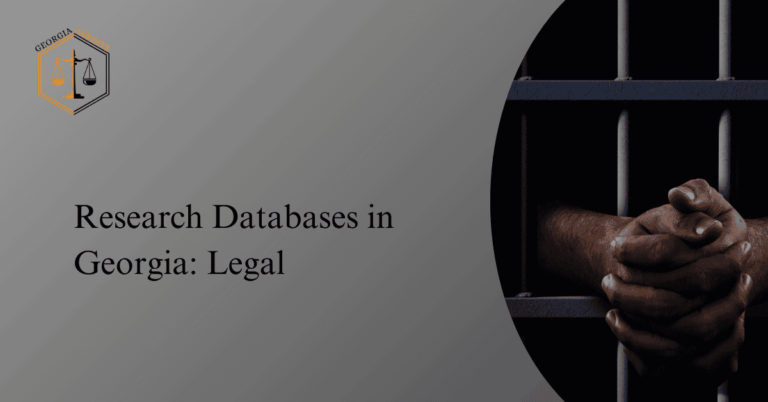Academic Journals: Georgia Legal Studies
Academic Journals: Georgia Legal Studies delve into the intricate world of legal matters within the state of Georgia. These journals serve as a valuable resource for individuals seeking in-depth analysis and insights into various legal topics, ranging from legislation updates to court decisions. Readers can expect to gain a comprehensive understanding of the legal landscape in Georgia through the informative articles and scholarly discussions presented in these journals.
With a focus on academic rigor and intellectual discourse, Academic Journals: Georgia Legal Studies are designed to cater to a wide range of readers, including legal professionals, scholars, students, and anyone with an interest in the legal field. By offering a platform for critical examination and debate on legal issues specific to Georgia, these journals play a crucial role in advancing legal scholarship and promoting a deeper understanding of the state’s legal system.
Overview of Georgia Legal Studies Journals
Legal scholars and practitioners in Georgia rely heavily on academic journals to stay updated on the latest developments in the field. These journals serve as a platform for the exchange of ideas, research findings, and critical analysis within the legal community. By exploring the diverse range of topics covered in Georgia legal studies journals, readers can gain valuable insights into the state’s legal system and contribute to the advancement of legal scholarship.
Importance of Legal Analysis in Georgia
Legal analysis plays a crucial role in shaping the legal landscape of Georgia. By examining and interpreting laws, regulations, and court decisions, legal scholars can provide valuable insights into the complexities of the state’s legal system. Through rigorous analysis and critical thinking, scholars can uncover hidden nuances in legal texts and contribute to the development of new legal theories and frameworks.
Legislation Updates in Georgia Legal Studies
One of the key focuses of Georgia legal studies journals is to provide readers with timely updates on legislative changes and developments. By staying abreast of new laws, regulations, and policies, legal practitioners can ensure compliance with the latest legal requirements and avoid potential legal pitfalls. These updates also allow scholars to analyze the implications of legislative changes on various aspects of Georgia’s legal system.
Court Decisions and Case Studies
Legal scholars in Georgia often rely on court decisions and case studies to gain a deeper understanding of legal principles and concepts. By examining real-world legal disputes and their outcomes, scholars can analyze the application of legal theories in practice and draw lessons for future cases. Case studies also provide valuable insights into the judicial reasoning behind specific legal decisions.
Scholarly Discussions on Legal Topics
Georgia legal studies journals serve as a forum for scholarly discussions on a wide range of legal topics. By engaging in debates, dialogues, and exchanges of ideas, legal scholars can explore different perspectives on complex legal issues and contribute to the development of new legal theories. These discussions foster intellectual growth and innovation within the legal community.
Role of Academic Rigor in Legal Scholarship
Academic rigor is a cornerstone of legal scholarship in Georgia. By upholding high standards of research methodology, analysis, and critical thinking, scholars can ensure the credibility and reliability of their work. Through rigorous academic inquiry, scholars can push the boundaries of legal knowledge and contribute to the growth of the legal discipline in Georgia.
Platform for Critical Examination and Debate
Georgia legal studies journals provide a platform for critical examination and debate on legal issues of significance. By offering a space for scholars to challenge prevailing assumptions, question established norms, and propose innovative ideas, these journals foster a culture of intellectual curiosity and exploration. Through constructive debate and dialogue, scholars can refine their ideas and contribute to the evolution of legal thought in Georgia.
Promoting Acknowledgment of Georgia’s Legal System
One of the primary goals of Georgia legal studies journals is to promote a deeper understanding of the state’s legal system. By publishing articles, essays, and research papers that shed light on different aspects of Georgia law, these journals help readers navigate the complexities of the legal landscape. Through in-depth analysis and discussion, scholars can enhance their knowledge of Georgia’s legal system and contribute to its ongoing development.
Advancing Legal Scholarship in Georgia
Georgia legal studies journals play a vital role in advancing legal scholarship in the state. By providing a platform for the dissemination of new ideas, research findings, and theoretical frameworks, these journals contribute to the growth and evolution of legal knowledge in Georgia. Through collaboration, innovation, and scholarly exchange, scholars can push the boundaries of legal scholarship and make meaningful contributions to the field.
Diverse Readership and Target Audience
Georgia legal studies journals cater to a diverse readership and target audience, including legal scholars, practitioners, students, policymakers, and the general public. By offering a wide range of content that appeals to different interests and expertise levels, these journals ensure that their insights reach a broad and varied audience. Whether readers are looking for in-depth analysis, practical insights, or theoretical discussions, Georgia legal studies journals offer something for everyone.
Frequently Asked Questions
Our Frequently Asked Questions section aims to provide detailed answers to common queries about Academic Journals: Georgia Legal Studies.
What are Academic Journals?
Academic journals are scholarly publications that contain articles written by experts in a particular field of study. They serve as a platform for researchers to share their findings and contribute to the academic community.
What is Georgia Legal Studies?
Georgia Legal Studies is a specialized field of study that focuses on legal issues and practices specific to the state of Georgia. It encompasses various topics such as state laws, court decisions, and legal research.
How can Academic Journals benefit researchers in Georgia Legal Studies?
Academic journals provide researchers in Georgia Legal Studies with a wealth of information on legal theories, case studies, and current legal developments in the state. By accessing these journals, researchers can stay updated on the latest trends and findings in their field.
Where can I find reputable Academic Journals on Georgia Legal Studies?
Reputable academic journals on Georgia Legal Studies can be found in online databases, university libraries, and legal research platforms. Researchers can also access these journals through subscription-based services or academic institutions.
What criteria guide journal selection for Georgia Legal Studies research?
When selecting academic journals for research in Georgia Legal Studies, it is essential to consider factors such as the journal’s impact factor, peer-review process, reevance to your research topic, and credibility in the legal community. By choosing reputable journals, researchers can ensure the quality and reliability of the information they use in their studies.
How to contribute Academic Journals in the field of Georgia Legal Studies?
Researchers and academics interested in contributing to academic journals in Georgia Legal Studies can submit their original research articles, case studies, or literature reviews to relevant journals in the field. By following the submission guidelines and peer-review process, authors can share their findings and insights with the academic community.







